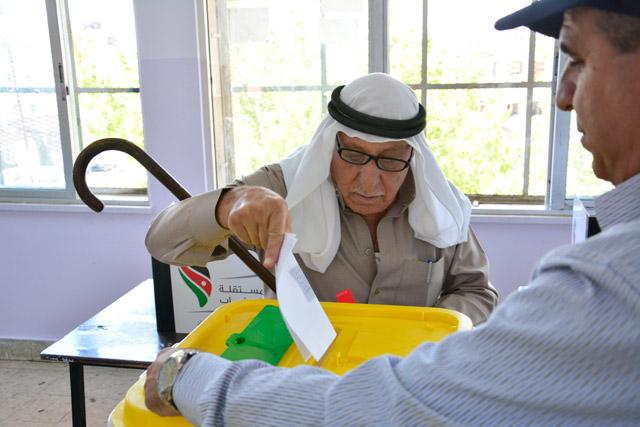You are here
Local election preparations in ‘full swing’, IEC says
By Laila Azzeh - Mar 08,2017 - Last updated at Mar 08,2017

Independent Election Commission President Khaled Kalaldeh speaks to reporters from The Jordan Times and Al Rai during a recent visit to the Jordan Press Foundation (Photo by Khaled Oudat)
AMMAN — With the municipal and governorate council elections five months away, preparations are in “full swing” to ensure a smooth electoral process, according to Independent Elections Commission (IEC) President Khaled Kalaldeh.
In a recent interview with The Jordan Times and Al Rai, he said that the decision to hold the elections on August 15 is designed to encourage maximum participation in the process. 
“By the end of last year, there were 4.640 million eligible voters who had turned 18. Around a quarter of them live abroad and conducting the elections in the summer will allow expatriates to take part in the elections,” Kaladeh said.
He added that students will be on holiday on the day of the elections, which will allow better organisation and the use of school classrooms as polling stations.
On the eligibility of candidates, Kalaldeh noted that every Jordanian 25 years old or above is eligible to run in the municipal elections, provided that they resign one month before running if they work for a state agency.
Those 25 or older can also run in the governorate council elections under the Decentralisation Law, provided that they resign 15 days before the elections if employed in a state body.
“However, accepting their resignation is not a condition,” said Kalaldeh, adding that the voter lists will be issued by the end of May and will include the names of military personnel.
“This is not a new step. All previous municipal laws included military personnel, but the chairmen of the joint chiefs-of-staff at the time decided to ban them from voting,” he said.
Expecting the elections to cost JD20 million, Kalaldeh cited plans to cut down the cost by nearly JD250,000 by reducing the number of voting centres and using sports halls for the process.
“Sports halls can replace several polling stations and are more comfortable for voters, media outlets and international observers classrooms.”

He noted that the government, represented by the Ministry of Political and Parliamentary Affairs, will cooperate with the IEC to raise public awareness of the law, while the Interior Ministry will be responsible for developing the capabilities of the cadres who will be enrolled in the decentralisation councils.
Under the Decentralisation Law, the Kingdom is divided into more than 100 electoral districts, and each voter will have only one vote if his/her district is represented by one person.
“If the district representatives exceed one person, each voter will have two votes regardless of the number of representatives,” explained Kaladeh.
Electors under the Municipal Elections Law will vote on two separate ballots; one for the municipal council president and another for a local council member.
“Illiterate people can vote with the help of the elections committee, [and their] fingers will be dipped in indelible ink to prevent the duplication of votes,” the IEC chief commissioner told reporters.
The law stipulates that 75 per cent of Greater Amman Municipality’s council members will be elected, while the remaining 25 per cent will be appointed by the Cabinet.
As for women, Kalaldeh noted that their participation in the public management of their respective governorates will empower them in the areas of development and politics, enabling them to assume leadership positions.
“Women’s presence in municipal and governorate councils will raise local communities’ awareness of the significance of their role,” the IEC president said.
Related Articles
AMMAN – The electoral lists for the local elections, due to be held on August 15, will be put on display on May 15, starting a "long" period
AMMAN — The Independent Election Commission's (IEC) preparations for the August 15 local and municipal elections are in their final stages,
AMMAN — Voting for the decentralisation and municipal elections concluded late Tuesday night with a 31.7 per cent voter turnout rate of some

















